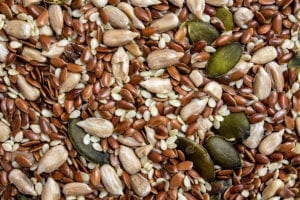How Do You Minimise Weight Gain During and After Menopause?

One of the common issues of growing older is weight gain. And for women, this weight gain is accelerated during menopause as the balance of hormones shifts.
Studies have shown that on average women gain between 6 and 7.5kg of weight between the age of 35 and 55 years.
What’s more, many women feel like they can’t lose fat no matter how well they eat and exercise. In fact, the extra stress of trying too hard to lose weight will further upset the levels of hormones, especially the stress hormone cortisol. This leads to more fat deposits and weight gain.
So how do you minimise weight gain?
It’s all down to the magical female sex hormones which play a major role in fat distribution. Indeed, it’s estrogen that distributes body fat to create the classic female shape.
So the trick is to have enough fat to be healthy, but not so much that you become susceptible to diseases associated with being overweight including;
- obesity
- high blood pressure
- dyslipidemia (blood lipids and cholesterol)
- insulin resistance
These are collectively known as metabolic syndrome and can lead to:
- cardiovascular disease
- diabetes
- inflammation
- liver and kidney damage
For this reason, there are lots of good reasons to maintain a healthy body weight and a great looking shape.
But it’s not all about estrogen. Progesterone and cortisol play a significant part in fat metabolism as well. The key to controlling weight gain during menopause is balance:
- balanced hormone levels
- a nutrient profile that’s balanced
- and a lifestyle that prioritises balance
The first way to manage weight gain? Balance your hormone levels
Balancing your hormones lifts the catabolic, or breakdown (think fat burning) side of the metabolic equation, and reduces the anabolic (fat depositing, weight building) side.
So if unwanted weight gain during menopause is something you’re experiencing then the first and easiest thing to do is get your hormones in balance.
One way to do this is with 40+ and 55+ which have been clinically trialed and shown to help with hormonal equilibrium.
And we invite you to read some of our suggested articles below.









